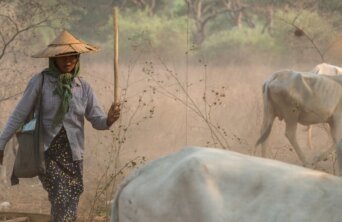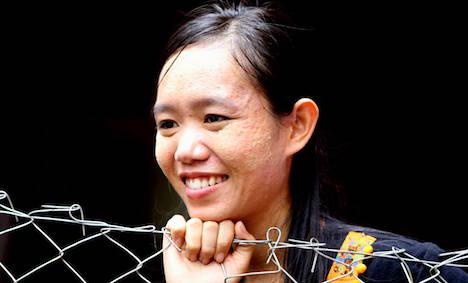- About
- Topics
- Picks
- Audio
- Story
- In-Depth
- Opinion
- News
- Donate
- Signup for our newsletterOur Editors' Best Picks.Send
Read, Debate: Engage.
| topic: | Human Rights |
|---|---|
| located: | Myanmar |
| editor: | Lital Khaikin |
Reports of human rights abuses in Myanmar's Rakhine State continue to emerge as the state enacts its new and controversial conscription law, in which all men aged 18 to 35 and women ages 18 to 27 are required to serve for up to two years under military command.
Testimonies collected by the London-based Burma Human Rights Network from the state's capital of Sittwe recount how the State Administrative Council (SAC) has declined ration cards and used humanitarian aid to bribe civilians to enlist in the army.
As the military junta's regional control falters, the law intends to recruit up to 60,000 soldiers by the end of this year. Tom Andrews, the UN Special Rapporteur on the situation of human rights in Myanmar, has described the draft as a sign of desperation amid "existential threats for the junta".
Since the ethnic cleansing campaign in 2017, Rohingya has been reduced to a reporting statistic. The escalation in fighting in October displaced a further 2,000 people from Rakhine state. Refugees face hostile reception and ceaseless calls for deportation in neighbouring countries.
India continues to demand the deportation of stateless Rohingya deemed "illegal immigrants" in the lead-up to spring elections. A suspected arson event tore through Kutupalong camp in Bangladesh in January, where the world's largest refugee camp is home to nearly a million Rohingya asylum seekers.
A new report issued by HRW decries the abusive and squalid conditions of Malaysian detention centres that hold Rohingya arbitrarily and indefinitely.
When refugees make the treacherous crossing of the Andaman Sea to Indonesia, they find no safety there either. As reported this past December, protesters in Indonesia's Aceh province attempted to prevent boats arriving with hundreds of refugees from docking.
The humanitarian crisis in Rakhine State is catalysed not only by armed resistance against the military junta's rule but also by a complex struggle to control the state's natural resources. The state is a strategic point for offshore oil and gas development, home to the South-Korean Shwe Gas project in the Andaman Sea.
Among its military victories this month, the China-backed Arakan Army, which opposes Junta rule, took control of Ramree, which the junta heavily bombarded in February. Ramree is also home to China's Kyaukphyu deep sea port, which has been instrumental in Russia's shipping crude oil to China via a pipeline that passes from Myanmar's western Rakhine state to Yunnan.
This port is part of the Kyaukphyu Special Economic Zone, an important hub in the China-Myanmar Economic Corridor, a testament to Myanmar's neoliberal ambitions under deposed state counsellor Aung San Suu Kyi.
In a geopolitical tug-of-war that grasps at control over Myanmar's natural resources, the country's humanitarian crisis risks further politicisation.
As shown by Aung San Suu Kyi's free-market capitalist development strategy, continuing to prioritise profit over human rights and environmental integrity in the country's resource development risks further dividing Myanmar along ethnic lines, exacerbating internal displacement and deepening hostility toward asylum seekers in the region.
Image by Marco Torrazzina.

